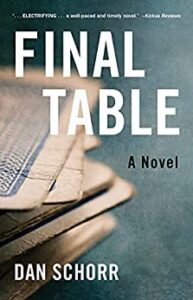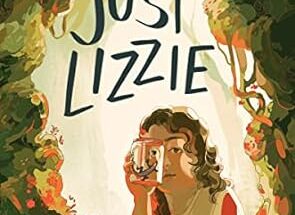 Kirkus calls Final Table, “An international political thriller that successfully weaves together multiple storylines. . . electrifying. . . A well-paced and timely novel.”
Kirkus calls Final Table, “An international political thriller that successfully weaves together multiple storylines. . . electrifying. . . A well-paced and timely novel.”
We couldn’t agree more. The story revolves around sexual misconduct in the #MeToo era played out against the backdrop of high-stakes poker tournaments and the threat of nuclear war.
In this, his debut novel, Final Table, author Dan Schorr draws on his firsthand experience as a New York City sex crimes prosecutor and sexual misconduct investigator, as well as his background as a television legal analyst for Good Morning America, CNN, Fox News, and elsewhere. Much of this riveting story revolves around a pulled-from-the-headlines murder of an American journalist at the direction of the crown prince of the fictional “Kingdom,” and the attempts of the victim’s sister and a political activist to get justice. Dragged into this mess are the protagonists: Maggie, a young political consultant coping with the aftermath of a sexual assault; and Kyler, a gambling-addicted poker star struggling to support his family. This seemingly incongruous mix meshes well and makes for an interesting commentary on the nature of international and sexual politics, as an ever-present social media chorus forces characters into gambling strategies—bluffing, going all in, showing or not showing their cards—in their attempts to attain normal lives and fair treatment.
Dead Darlings is pleased to introduce debut novelist Dan Schorr.
Often writers are asked, “What qualified you to write about this subject?” We don’t have to ask you that question, but rather, why did you want to write a story drawn from your own work experience?
As a sex crimes prosecutor and investigator, I’ve wanted to write a novel involving real-world sexual misconduct issues for a while. I’ve often noticed that the media generally portrays stories of sexual assault in stereotypical, unrealistic ways. I’ve recently seen a disturbing increase in complaints involving ‘stealthing,’ which is when one person surreptitiously removes a condom during sexual intercourse without the other person’s knowledge or consent. How to address this is becoming a hotly debated issue in sexual misconduct circles, college campuses, state legislatures, and elsewhere, as it’s currently not defined as a sexual assault crime in any state. This inspired me to write about one person’s struggle to deal with the many emotional and physical consequences of sexual assault via ‘stealthing.’
The title of your book refers to when professional poker players reach the finals of a big tournament. At that point, they are seated at the ‘final table.’ Your poker scenes feel very authentic, capturing both the tense atmosphere, as well as the hidden strategies behind these games. Are you a poker player? What kind of research did you do to better understand the world of professional poker?
I very much enjoy poker and have played regularly over the years, including occasionally with some top pros, and in interesting environments, such as a major tournament in Macau, China, that influenced the foreign tournament in the book. I didn’t conduct additional independent research for this novel, but I channeled a lot of my personal experience into Kyler’s poker adventures. In fictional accounts of poker, the main character is usually an extremely talented player, so I thought it would be more interesting to have the action here through the perspective of a decent but not superb player, who is struggling to win while at times up against more skilled combatants.
Poker is a theme throughout the book, not just as a game, but as a strategy for how characters negotiate with one another in other settings. After hearing in detail how Kyler performs in a poker tournament, we see him trying to use some of those same skills to resolve a law suit, wondering whether his opponent is bluffing or if he has information that would give him a ‘winning hand.’ Elsewhere in the book we see sexual partners, political opponents and even countries squaring off against one another using some of these same tactics. Conflicts are often resolved not by who is right, but by who has been dealt a better hand; i.e., who has more power. Can you comment on your use of this theme?
One reason I find poker so fascinating is that the strategies, challenges, and complex analysis mirror decision-making processes throughout life. Bluffing and recognizing the bluffs of others are regular occurrences in the business world, personal interactions, and elsewhere. So many different aspects of human interactions involve these huge decisions that must be made under extreme stress with incomplete information, and the costs of mistakes, in the novel and in real life, can be disastrous.
Readers of this novel will inevitably draw parallels between the ‘Kingdom,’ as it’s called in your book, and Saudi Arabia and the death of journalist Jamal Khashoggi. Was there a particular reason you chose to use this incident in your book?
The fictional Kingdom is actually inspired by different aspects of several nations, most notably Saudi Arabia, North Korea, and China. I’ve read a lot about Saudi Arabia, and my personal experiences traveling in North Korea and China influenced much of the book. The fictional murder of a journalist in the novel was equally inspired by the murders of Jamal Khashoggi in Saudi Arabia and Otto Warmbier in North Korea. These and other atrocities lead to challenging questions of how the United States should best respond, and what the consequences will be of our retaliation. We can’t let killings like these go without consequences, but we also know that a military response is rarely simple, and could lead to its own tragic consequences and dangers, especially when another nuclear power is involved.
Although there are two main characters in your book, there are four points of view—from two men and two women. Why did you approach the book in this way, and did you find it a challenge to write from so many POVs, especially the women?
As an investigator, I am fascinated by the concept that events are often perceived and reported very differently by various people, who may have dissimilar perspectives, memories, and opinions. I wanted to show this complex situation from the viewpoints of four people whose issues, goals, and experiences were not aligned with each other. To me, it doesn’t matter if the character is male or female, as long as I feel as if I know this person and can understand them, which often derives from my own personal experiences or those of others with whom I have spoken.
Maggie is a political consultant who aspires to become a cable TV pundit, a role you’ve played in your own life. She finally gets offered an appearance–or ‘hit,’ as you call it—if she’ll agree to take a position contrary to her own beliefs. And later in the book, you mention a new television “reality show in which a bunch of political consultants [are] locked in a house together…and have contests to sway the audience to a host of random issues with viewers voting” on who was the most persuasive. It’s a somewhat cynical view of cable news, at least in your fictional world. Do you think political punditry works in these disingenuous ways in the real world, too?
Not all news shows are like this, but the superficial depiction in the novel exists for many actual cable shows. I have done a lot of television legal commentary, and, especially early in my career, was asked to change sides or take a side that I didn’t agree with. That way the producers had one person representing each side with pre-disclosed talking points. When faced with this situation, I either declined to take the side with which I disagreed, or I said okay but then stuck to what I really believed once I got on air—an option that Maggie considers but then rejects in the novel.
At the beginning of the book, an incident of sexual misconduct occurs between Maggie and her powerful ex-boss. It unintentionally gives her the upper hand in her relationship with him until he retaliates in a more vengeful way. All of this is fueled by the media and social media. As an expert in this field, do you think the #MeToo movement would have been possible without the explosive development of social commentary? Do you think social media or other facets of the internet bare responsibility for the seeming increase in sexual misconduct itself—or has it always been there, but was more easily hidden until these tools made it easier to expose?
As someone who has prosecuted and investigated sexual misconduct for many years, I don’t believe there is an increase in sexual misconduct – it has sadly been very prevalent for all of human history. What we have now is an extremely important and long overdue increase in the reporting of sexual misconduct, as survivors are more emboldened to speak up about mistreatment that previously went unreported. Social media has certainly been a major catalyst for people being able to tell their stories unfiltered, but social media has also created many new, highly troubling ways for people to harass and intimidate others. Fortunately, this society-wide sexual misconduct reckoning has resulted in many organizations reforming their cultures and policies to better detect, deter, and sanction sexual misconduct. Nevertheless, sexual misconduct is still very prevalent throughout our world, in both subtle and not-so-subtle ways.
As your book dramatizes, there’s great risk for women who call out powerful men in this way. These days, not only are the names and stories of these women broadcast everywhere, but potential male employers, who are fearful of being similarly accused, might refuse to hire or work with these women. Careers can be ruined by making these charges. What are your thoughts on the courage it takes for women to call out powerful men?
It is very courageous for anyone to report misconduct they have experienced, no matter what gender they are. I have investigated many cases involving male complainants, so experiencing sexual misconduct is certainly not limited to females. Individuals often face great risks by stepping forward to report sexual misconduct, discrimination, and/or other mistreatment, as even someone who is widely believed to be credible may face disturbing violations of their privacy and have their career significantly derailed as a result.
Here’s one question we at Dead Darlings always like to ask: Did you personally have any ‘darlings’ you had to cut? What is your favorite scene that didn’t make it into the final novel, and why did you cut it?
There were actually two scenes I liked a lot that I removed. One involved a lengthy conversation between Kyler and Maggie later in the book in which they shared. They each had some lines that I thought well-captured their feelings and attitudes, but I decided this was all better told through the actual action in the novel. Second, regarding your earlier question about cable news, I had a flashback scene in which Maggie plays a drinking game with some other burgeoning political commentators in which they take turns pretending to give serious television commentary while doing shots and getting progressively intoxicated. I think it would have been an entertaining scene, but didn’t end up fitting well with the rest of the narrative.
Can you tell us about your writing routine? How do you balance writing with work?
Pre-Covid I used to travel a lot for work, and I often wrote while on trains and planes, and in hotel rooms. Now that I’m rarely traveling, I try to set aside a certain amount of time to regularly write, but balancing that with other work and personal/family life can be challenging. I think it’s important to set reasonable, regular goals, such as to write a certain number of words each day or each week, in order to stay on track.
What are you reading now?
My favorite books that I have recently completed include My Dark Vanessa by Kate Elizabeth Russell, Luster by Raven Leilani, A Burning by Megha Majumdar, Summer on the Bluffs by Sunny Hostin, the Glass Hotel by Emily St. John Mandel, My Year of Rest and Relaxation by Ottessa Moshfegh, and Boy Parts by Eliza Clark. I’m very much looking forward to reading He Gets That From Me by Jacqueline Friedland.
Final Table is your first published novel. Can we look forward to seeing other novels from you?
Yes, I am currently writing a new novel that is a behind-the-scenes look at sexual abuse in collegiate athletics and the corporate misconduct investigations industry.
Dan Schorr is a sexual misconduct investigator at his firm, Dan Schorr, and an adjunct professor at Fordham Law School, where he teaches a course on sexual misconduct and domestic violence. Previously, he served as a New York sex crimes prosecutor, the Inspector General for the City of Yonkers, and an adjunct law professor with Tsinghua University in Beijing, China. He has been a regular television legal analyst for Good Morning America, CNN, Fox News Channel, Law & Crime Network, and elsewhere. Schorr holds a BA and MA from the University of Pennsylvania, and a JD from Harvard Law School. He lives in White Plains, New York, with his wife and two children. Final Table is his first novel.



